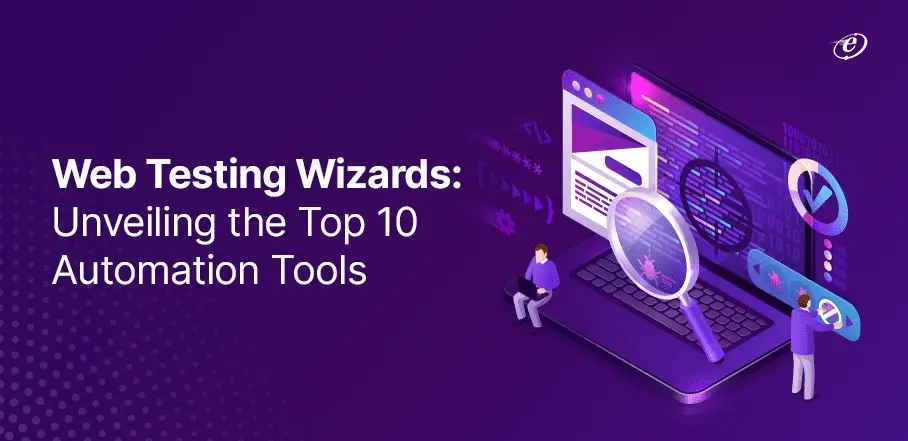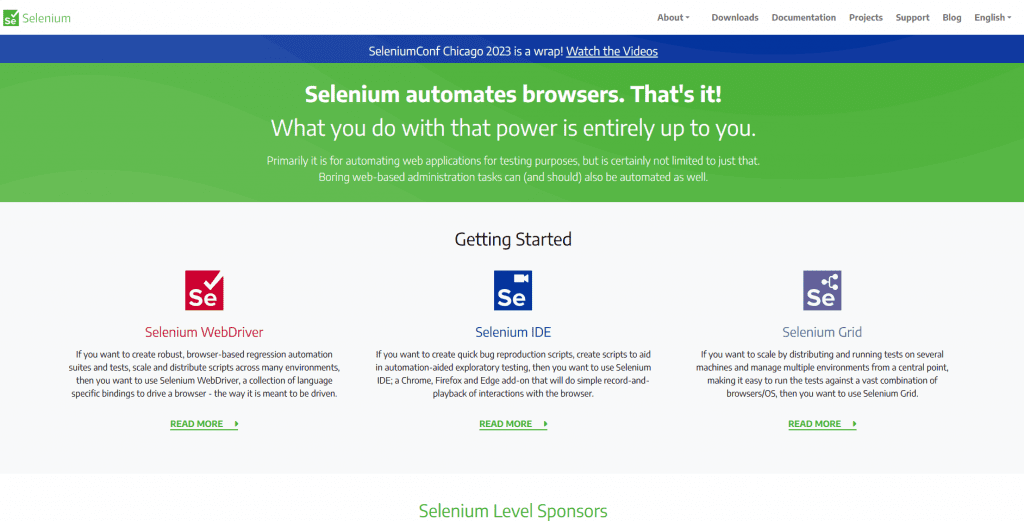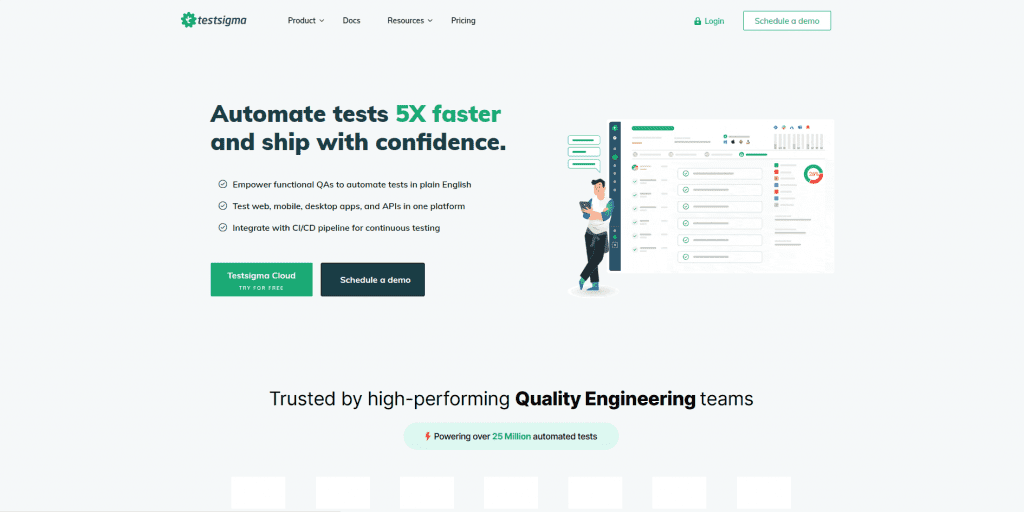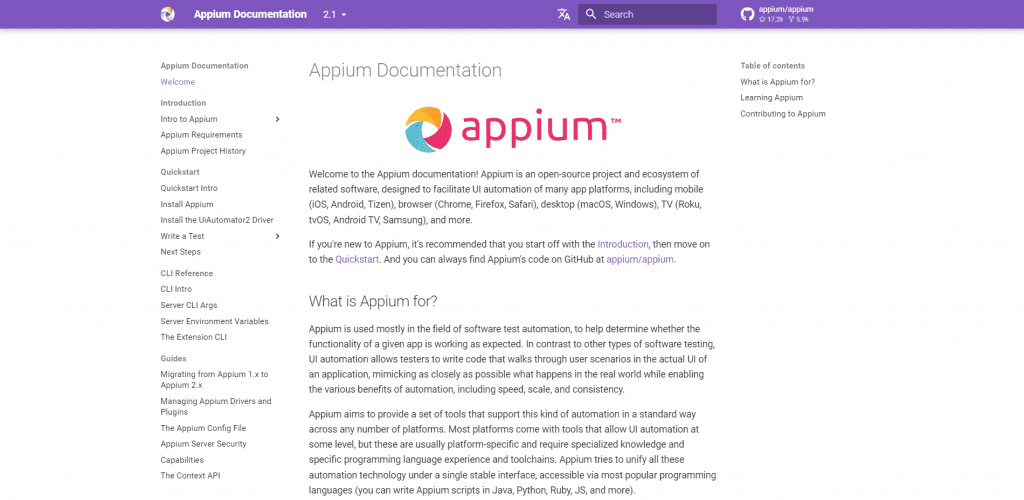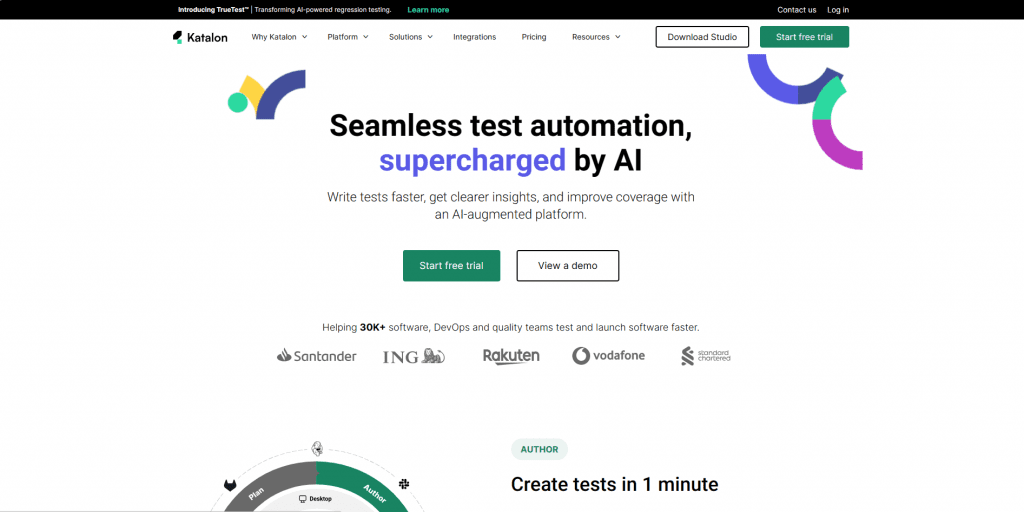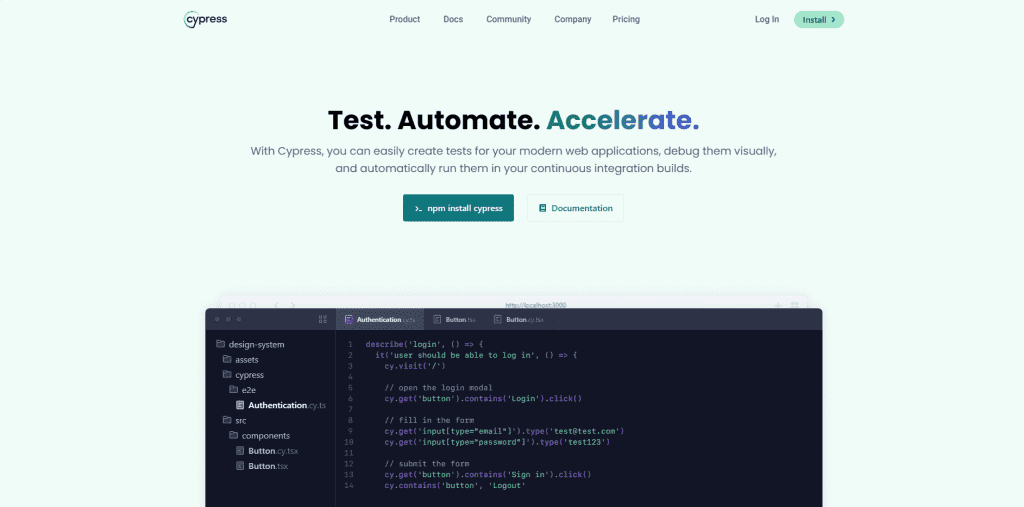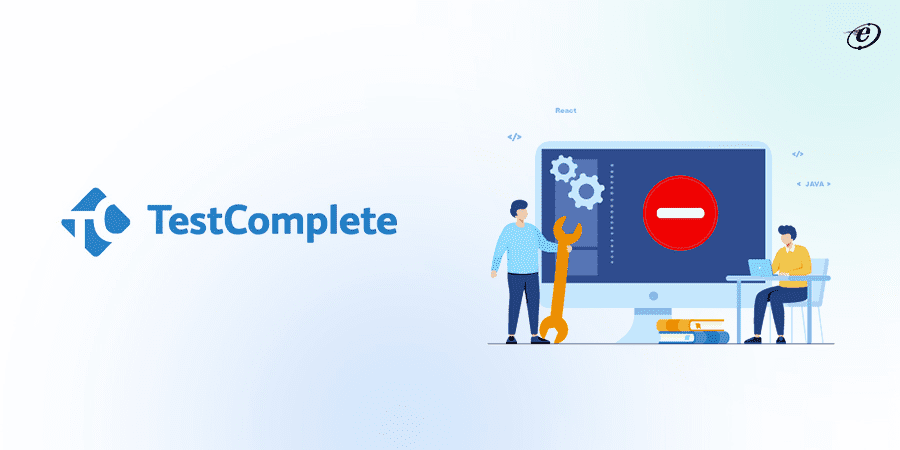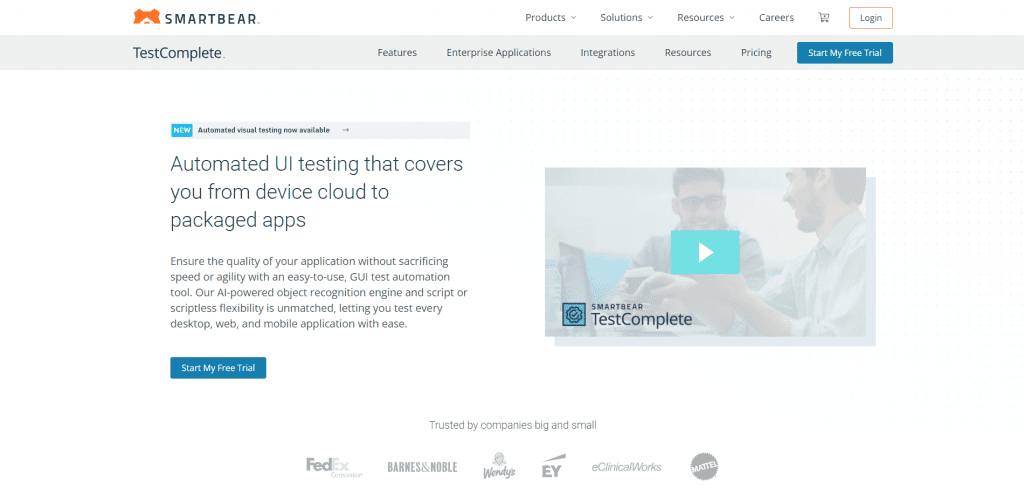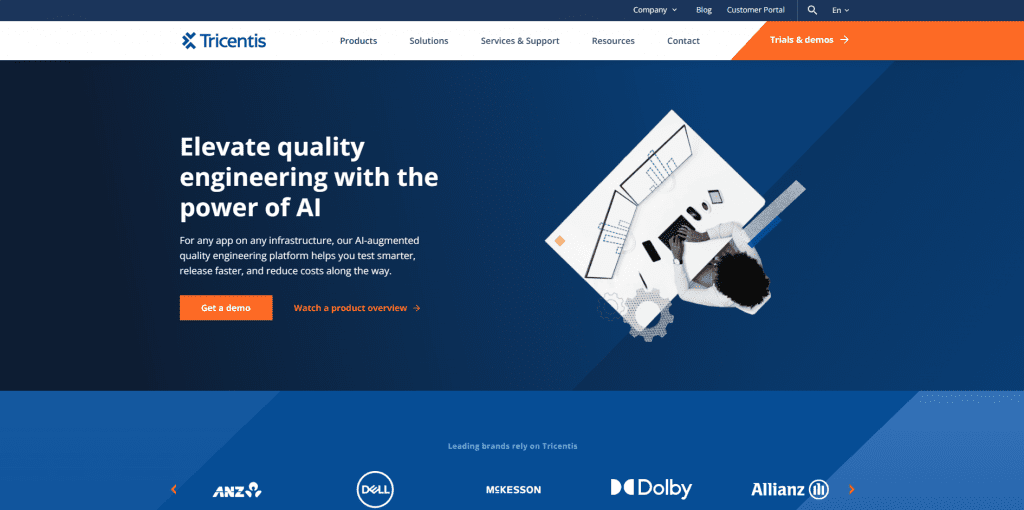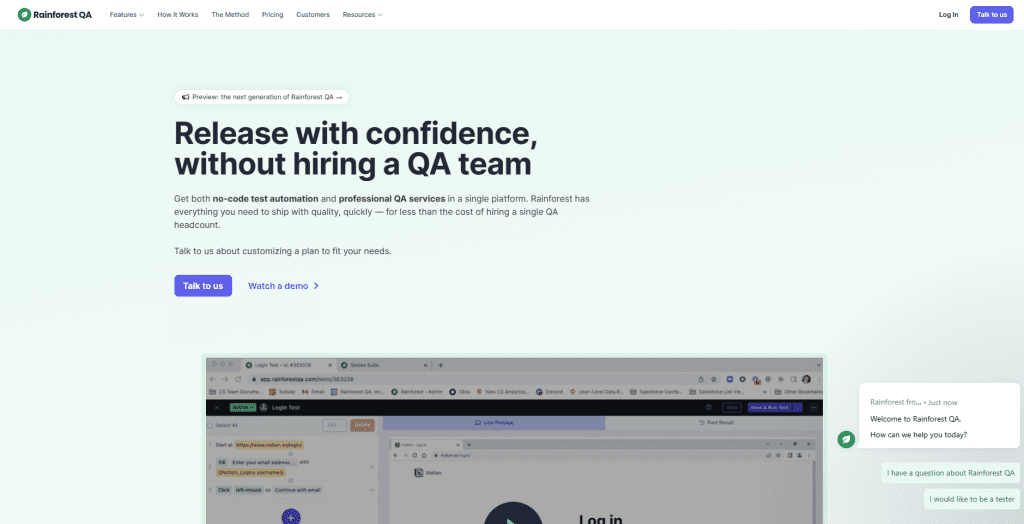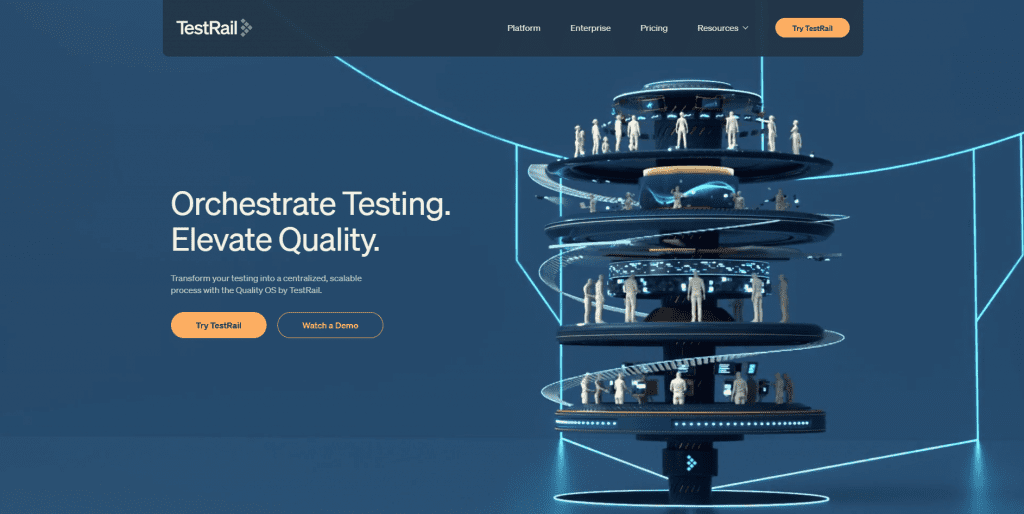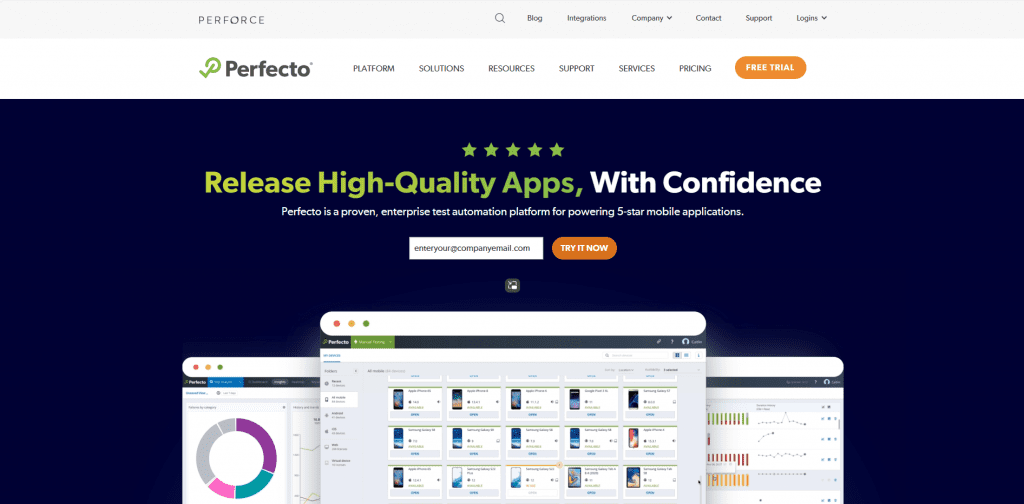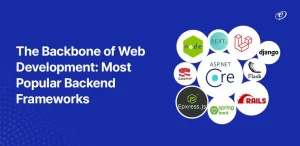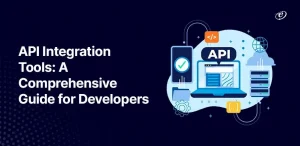A website comprises architecture, a collection of technologies, UI/UX design, and security procedures. Checking these items will help you ensure your web app or website is operating properly.
Testing is crucial to guaranteeing a website’s dependability, functionality, and security during development. Testing is essential to providing users with a flawless and error-free online application.
As much of the world around us becomes automated, so do these testing tools. Today’s blog post will discuss the top 10 automated testing tools for web applications.
You may have encountered dysfunctional application functionality at some point, which is annoying. However, automation testing tools make it simple to avoid them.
By the end of 2032, the global automated testing market is anticipated to grow at a 14.3% compound annual growth rate and be valued at US$ 93.6 billion.
(Finding: Futuremarketinsights)
Automation testing is now a critical component of testing methodologies used by enterprises striving to provide high-quality software products on shorter timelines. Let’s see how these tools help custom web application development companies:
- Faster Test Execution: Accelerates testing processes compared to manual methods.
- Early Defect Detection: Identifies issues in the early stages of development.
- Efficient Repetition: Handles repetitive tests with precision and efficiency.
- Detailed Reporting: Generates comprehensive reports for analysis.
- Enhanced Productivity: Frees up resources for more strategic tasks.
- Adaptable to Code Changes: Accommodates frequent modifications with ease.
- Improved Software Quality: Contributes to delivering robust, high-quality software.
Leverage all the above benefits with the aid of the top 10 automated testing tools for web applications that we are going to cover. But before diving deep into them, let’s get into the basics of automation tools.
What is Automation Testing?
Software testing utilizing an automation tool to run an automation test suite to identify system flaws is known as automation testing.
It automates repetitive yet essential testing processes, enhancing efficiency and accuracy in software development. Through automation, tests are executed faster and more consistently, allowing for the early detection of defects.
Automation tools carry out the following tasks automatically: they run the test scripts, compare the actual test result to the expected test result, take screenshots, record system test results, and generate detailed automation results.
Top 10 Automated Testing Tools
Short on time? Then, refer the table below for a quick look at the 10 best automated testing tools:
| Automated Testing Tools | Pricing (Approx.) |
| Selenium | Free |
| TestSigma | Varies as per Plans |
| Appium | Free |
| Katalon | Free – $167/month |
| Cypress | $67- $267/month |
| TestComplete | $1,828 – $5,686/month |
| Tricentis | Starting at $69/month |
| Rainforest QA | 450/year |
| TestRail | Starting at $37/month |
| Perfecto | $85 – $125/month |
Types of Web App Testing That can be Automated
Various types of web application testing can be automated to improve efficiency, accuracy, and speed in the software development lifecycle.
Some prominent types of web app testing suitable for automation include:
| Type of Testing | Why Automate? |
| Functional Testing | Automated tests validate the application’s functions, ensuring they perform as expected, covering unit, integration, and system testing. |
| Regression Testing | Automation is crucial for repetitive testing after code changes, ensuring new updates do not break existing functionalities. |
| Usability Testing | Automated scripts can assess the user interface, navigation, and overall user experience to identify usability issues. |
| Performance Testing | Automated tools simulate various user scenarios to assess the application’s performance under different conditions, helping identify bottlenecks and optimize speed. |
| Security Testing | Automated tools can scan for vulnerabilities, assess encryption mechanisms, and identify potential security risks in the web application. |
| Compatibility Testing | Automation helps test the application’s compatibility across different browsers, operating systems, and devices, ensuring a consistent user experience. |
Automate to Elevate: Uncovering the Top 10 Automated Testing Tools for Web Applications
Here’s a list of ten popular automated testing tools for web applications, considering factors like ease of use, popularity, and versatility. Remember that a testing tool’s effectiveness can vary based on the specific requirements of your project.
1. Selenium
Selenium is one of the widely used open-source automated testing tools for web applications. It supports multiple programming languages and browsers, making it versatile for web application testing.
This tool integrates with your applications through desktop and mobile browsers, enabling you to run Javascript code and simplifying the process of testing your DOM’s dynamic elements. Selenium supports several programming languages besides Javascript, including C#, Python, Ruby, and Java. Basically, this tool can be used by any developer with proficiency in any coding language to facilitate easier implementation within development teams.
Selenium is a reliable automated testing tool for web applications. It’s evident from thorough testing and analysis that Selenium is diligently built for automating web browsers.
Selenium provides dedicated developers and testers with the required tools and libraries to work seamlessly with online applications. It can do more than just test; it can also be used for web scraping and browser automation.
Features of Selenium
- It ensures consistency across different browsers.
- It easily integrates into continuous integration and continuous deployment (CI/CD) pipelines.
- It supports plugins and extensions for enhanced functionality.
- It is ideal for functional and regression testing of web applications.
- It speeds up testing by running multiple tests simultaneously.
- It integrates with popular testing frameworks like TestNG and JUnit.
Price
Open-Source free to use.
2. TestSigma
Testsigma is a cloud-based automated testing tool for web applications. It is designed for continuous testing of web and mobile applications. Offering scriptless test automation enables experienced developers and non-technical users to create and execute tests seamlessly.
It streamlines testing by combining no-code techniques with artificial intelligence (AI). This AI-driven paradigm makes testing more accessible to a broader range of team members by accelerating test creation and lowering the learning curve. Cross-browser and cross-platform testing are also made flexible by Testsigma, guaranteeing consistent application performance in various settings.
Testsigma’s collaborative features facilitate team communication, making it a user-friendly solution for ensuring software applications’ reliability, scalability, and performance throughout the development lifecycle.
Features of TestSigma
- It enables test creation without coding through a user-friendly interface.
- It uses artificial intelligence for smart test maintenance and adaptability.
- It facilitates easy access, collaboration, and scalability in the cloud.
- It also provides support for testing mobile applications.
- It provides comprehensive reports for effective test analysis.
- It efficiently manages test data for varied scenarios.
Price
It comes with two plans, pro and enterprise level; click here for a detailed comparison of both plans.
3. Appium
It is also an open-source automated tool for testing web applications and mobile applications. Appium allows cross-platform app testing and supports various programming languages.
Appium seeks to offer a suite of tools that uniformly enable this type of automation on multiple platforms. Most platforms include tools that enable some UI automation; however, these are typically platform-specific and call for toolchains, specific programming language experience, and specialized knowledge.
With its stable interface that is compatible with the majority of widely used programming languages (Appium scripts can be written in Java, Python, Ruby, JS, and other languages), Appium aims to combine all these automation technologies under one roof.
It is advised that you begin with the introduction if you are unfamiliar with Appium before moving on to the Quickstart. Additionally, Appium’s code is always available at appium/appium on GitHub.
Features Appium
- Provide platform-specific automation features via a standard, cross-platform API.
- Make this API accessible in any programming language.
- Give the community the resources they need to easily develop Appium extensions.
- It supports programming languages including Java, C#, Python, JavaScript, Ruby, PHP, and Perl.
- It utilizes the same APIs and reusable test scripts for cross-platform testing
- Its integrations with CI/CD tools and additional testing frameworks
Price
Open-Source, Free
4. Katalon
Katalon is a scalable and low-code automation testing tool for web applications, desktop (Windows), mobile, and API applications. This robust automation testing tool is well-known for its adaptability and features that are easy to use. It performs exceptionally well end-to-end testing, offering effective test creation and execution while encouraging teamwork and feedback. It excels in continuous testing by converting automated tests into continuous ones and integrating them smoothly into your ecosystem.
Katalon Studio is so popular among web application development companies as a top-notch automation testing tool for web applications because it has unique features that set it apart from the competition. Moreover, integration with CI/CD tools like BitBucket, Jenkins, Azure DevOps, Git, Github, Azure DevOps Repos, and DevOps tools like Docker are all provided by Katalon.
Find the video tutorial and detailed tool documentation on Katalon Academy.
Features of Katalon
- Test design techniques that are flexible include manual, scripting mode, and record and playback.
- Self-healing mechanisms, intelligent waiting, and automatic retrying of failed tests.
- With test artifact sharing and page object model design, reusable test objects, keywords, and test cases are possible.
- Robust user interface debugging and test reporting to diagnose and fix issues promptly
- Integration with well-known teamwork platforms for improved test preparation
Price
A free version with limited features is available. To avail of further features, move to paid plans- Premium & Ultimate. Click here to get detailed information.
| Plans | Price |
| Premium | Starting from $167/month billed annually |
| Ultimate | Custom Pricing |
5. Cypress
This automated testing tool for web applications is available as an open-source project and is renowned for its extensive documentation and plenty of included libraries. Cypress is primarily concerned with end-to-end testing, particularly for applications that employ contemporary JavaScript frameworks. Their official website says Cypress “makes setting up, writing, running, and debugging tests easy.” It was developed on top of Mocha.
Cypress is especially useful for applications built with modern JavaScript frameworks such as Angular, React, and Vue. It can also perform its magic with programs that are rendered on servers. With blazingly quick test development and execution, features like DOM modification and shadow DOM may be leveraged to build robust end-to-end testing scenarios.
Features of Cypress
- It offers instant feedback on code changes during test development.
- It enables easy debugging by rewinding and inspecting test execution.
- It provides a comprehensive framework for testing the entire application.
- User-friendly commands for seamless interaction with the application.
- It captures the test state and provides video recording for analysis.
- Allows efficient simultaneous test execution, optimizing testing workflows.
Price
Free to some extent. It comes with various pricing plans.
| Plan | Price |
| Team | Starting at $67/ month Billed annually at $799 |
| Business | Starting at $267/ month Billed annually at $3,199 |
| Enterprise | Custom price |
6. TestComplete
TestComplete, offered by Smartbear, is a GUI testing automated testing tool for web applications that individuals with different technical proficiency may use. Its choices for creating tests, which let users select between code-based and codeless methods, demonstrate how versatile it is. This covers features including recording and replay, as well as writing scripts in Python, VBScript, and JavaScript.
Functional user interface testing for web, mobile, and desktop apps may be automated with TestComplete. TestComplete includes built-in support for over 500 controls and third-party frameworks, enabling it to handle and recognize dynamic user interface elements in most technologies.
Moreover, TestComplete enables customers to run functional user interface tests simultaneously on local computers or cloud resources, making the shift to continuous testing and delivery easier.
Features of TestComplete
- It ensures compatibility across various browsers and operating systems.
- It supports both code-based and visual testing approaches.
- It seamlessly integrates with continuous integration and delivery pipelines.
- It offers a powerful Integrated Development Environment (IDE) for test creation and management.
- It covers a broad spectrum of application types.
- It supports team collaboration and version control for efficient testing workflows.
Price
Offer fixed and floating prices, check out the table below.
| Plans | Fixed | Floating |
| TestComplete Base | Starting at $1,828 | Starting at $3,655 |
| TestComplete Pro | Starting at $2,842 | Starting at $5,686 |
7. Tricentis
Tricentis Tosca is included in the list of comprehensive automated testing tools for web applications It has a unique model-based testing approach. It enables dedicated software development team to generate a business-familiar model for test creation and maintenance by scanning the user interface or application’s APIs.
The qTest module from Tricentis is made to centrally manage software testing at every stage of the development process. With the tool, you can achieve 90% end-to-end automation rates, saving your team some testing time. Tricentris offers cross-browser compatibility and supports CI/CD. It is compatible with Cucumber, Jira, Jenkins, Azure, and other technologies.
Feature of Tricentis
- It achieves test asset reusability and codeless test creation using the model-based approach.
- Using service virtualization to create realistic and stimulating testing environments
- Risk-based test optimization combined with requirement prioritization and smart test design
- API scanning with a wide range of API technology support
- Cross-platform and concurrent testing
- Integrations with CI/CD tools and additional testing frameworks
Price
Comes with yearly plan of $450/ year and monthly plan of $ 69/month
8. Rainforest QA
Rainforest QA is a cloud-based automated testing tool for web applications designed for agile and continuous delivery environments. It allows professional testers to execute tests on real devices and browsers, ensuring comprehensive test coverage.
For agile and post-agile teams, Rainforest is one of the most effective no-code QA automated testing tools for web applications. You can create tests with this cloud-based tool’s user-friendly visual editor with just a click or drag-and-select of the mouse.
Using a scriptless, natural language approach, Rainforest QA enables web development teams to create and execute tests without extensive coding. Its key features include on-demand testing, parallel execution, and integration with popular CI/CD tools.
Features of Rainforest QA
- It utilizes a crowd of professional testers for diverse testing scenarios.
- It allows test creation without coding, using natural language.
- It enables flexible and scalable testing as needed.
- It seamlessly integrates with CI/CD pipelines for automated testing.
- It facilitates collaboration between developers and testers.
Price
Click here to learn about the pricing details.
9. TestRail
TestRail is a web-based tool for managing test cases. Software developers, team leads, and QA engineers use it to plan, coordinate, and manage software testing activities. With TestRail, team members can plan test cases, arrange test suites, carry out test runs, and monitor the outcomes from a contemporary, user-friendly web interface.
It is one of the most used automated testing tools for web applications. It lets you manage and arrange test suites and cases in an optimized application structure and user interface. TestRail’s email notifications, filters, and to-do lists make it easier to plan test runs and boost tester accountability and productivity.
Feature of TestRail
- It enables developers to effectively arrange reusable test cases into folders and track the real-time progress of test execution.
- It is easily integrated with a number of automation testing and project management tools, including Selenium, Jenkins, and JIRA.
- To keep an eye on all of your test activities and quality metrics, TestRail provides a single platform.
- TestRail facilitates the expeditious generation of traceability reports, providing real-time testing progress tracking to all team members.
- Using TestRail to plan, schedule, and monitor agile test cases, you can speed up your testing process.
- This tool provides sophisticated filters to initiate test runs and choose test cases.
- You can effectively filter, group, and arrange your results with TestRail.
Price
Here are the details of the TestRail plans and pricing.
| Plans | Pricing |
| Professional Cloud | $37 per month per user |
| Enterprise Cloud | Custom pricing |
| Plans | Pricing |
| Professional Server | $8140 per year 1 to 20 users |
| Enterprise Server | $16500 per year 1 to 20 users |
10. Perfecto
Perfecto is a cloud-based testing platform designed for end-to-end continuous testing. Although it supports web and mobile applications, it is considered one of the best-automated testing tools for web applications. It offers a vast selection of real devices and browsers for comprehensive testing.
Perfecto provides DevOps teams with automated cross-environment executions, custom capabilities, test analysis, and comprehensive integrations to make continuous testing easier.
The platform also incorporates AI for intelligent test automation and offers rich reporting and analytics to provide actionable insights. Perfecto is known for its scalability, collaboration features, and support for various testing types.
Feature of Perfecto
- It creates UI web application tests without using scripts
- It offers cross-platform and parallel execution.
- Integrations with CI/CD tools and additional testing frameworks
- Real-world user stimulation for mobile testing: other environmental factors and network visualization
- It offers advanced test analytics featuring an AI noise filter and a centralized dashboard
Price
Check out the table below for pricing details.
| Plans | Price | Package Include |
| Live | Starting at $83/month | Manual testing from anywhere |
| Automate | Starting at $125/month | Automated + manual testing |
| Scriptless | Custom Pricing | No-code web automation |
| Enterprise | Custom Pricing | Extra features, support, & security |
What are the Limitations of Using Automated Testing Tools for Web Applications?
Automation testing tools are vital in software development, enhancing efficiency and ensuring the quality of applications. However, they come with challenges that the development team needs to address for successful implementation.
-
Dynamic User Interfaces
Applications with dynamic and frequently changing user interfaces pose a challenge for automation tools.
-
Test Data Management
Automation tests often require a consistent and reliable test data set. Managing and maintaining this data can be a significant challenge, especially in dynamic and complex scenarios.
-
Parallel Execution
While parallel test execution is essential for faster feedback, it introduces challenges such as resource contention and synchronization issues. Coordinating tests running simultaneously in different environments can be intricate.
-
Flakiness and False Positives
Flaky tests that produce inconsistent results can erode trust in automation. Identifying and addressing flakiness, as well as minimizing false positives, is crucial for maintaining confidence in automated test results.
-
Lack of Skilled Automation Testers
The effectiveness of automation depends on the expertise of the testing team. Finding skilled automation testers proficient in testing concepts and automation tools can be challenging, leading to a potential skills gap.
Addressing these challenges requires a holistic approach, combining effective test strategy, and collaboration between development and testing teams to build robust and maintainable automation frameworks.
Points to Consider When Choosing an Automated Testing Tools for Web Applications
To choose the right automated testing tools for web application, start with the four WHs (What, Who, When, and Why). So, let’s briefly cover each of them:
What is being tested?
What do you want to test- desktop, mobile, or web applications, or else the product’s UI, service/integration, units, end-to-end, etc.?
Who is doing the testing?
Who will use the automated testing tools for web applications? Do non-technical team members have a place in the testing process and should eventually be able to interpret the results?
WHY are tests necessary?
This question focuses on two crucial areas: the degree to which the tool you use integrates with continuous development and integration processes and the degree to which it supports the tests by programmers.
Once you get answers to the above question you will be in the right stage to choose the best automation tool for web application project.
Conclusion
The increasing traction of ideas like agile is pushing businesses to reconsider how they create software. The key elements for successfully implementing agile testing are automation, adaptability, cross-team collaboration, and changeability.
Each of the best automated testing tools for web applications we’ve covered here has unique qualities and abilities that meet different testing requirements. These tools offer a wide range of features to help you streamline your testing processes, whether you’re testing web, mobile, or API applications.
In 2024, when you start your testing journey, remember that the key to creating reliable software will be choosing the tool that best fits the needs of your project and its technology stack.
Contact our web application development team if you need assistance selecting the ideal automated testing tool for web application or if you have any queries.

QA Lead
Having 16+ years of experience in Quality Assurance and software testing. He is ISTQB certified and certified in Security Testing (EHE & NDE). His skill set includes Agile-Scrum methodologies, Quality Assurance, Manual & Automation with Selenium, Mobile App Testing, and Performance Testing.
